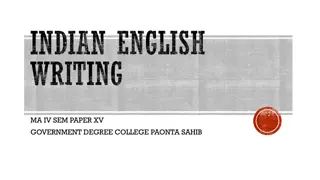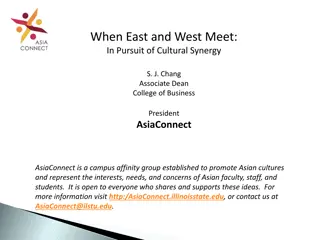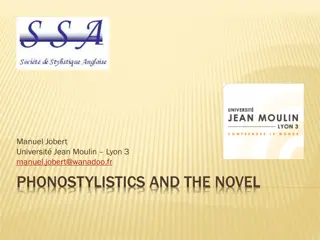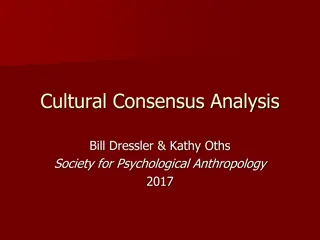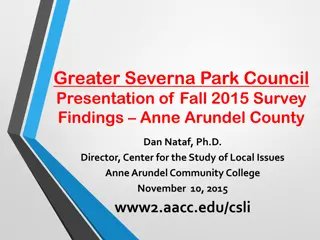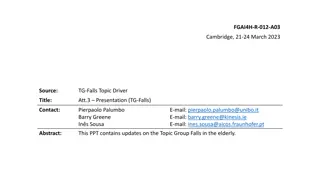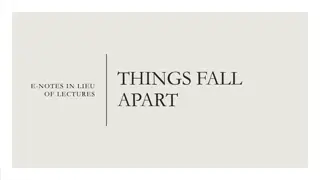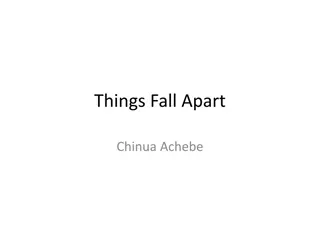Cultural Aspects and Fictional Elements in Chinua Achebe's 'Things Fall Apart'
'Things Fall Apart' by Chinua Achebe explores the impact of colonization on traditional Igbo culture in Nigeria in the late 1800s. The novel delves into themes of cultural change, characterizing figures like Okonkwo and Unoka amidst a backdrop of polygamy, agriculture, ancestral worship, and the clash between traditional beliefs and Christianity.
Download Presentation

Please find below an Image/Link to download the presentation.
The content on the website is provided AS IS for your information and personal use only. It may not be sold, licensed, or shared on other websites without obtaining consent from the author. Download presentation by click this link. If you encounter any issues during the download, it is possible that the publisher has removed the file from their server.
E N D
Presentation Transcript
CULTURAL ASPECTS AND ELEMENTS OF FICTION IN CHINUA ACHEBE S THINGS FALL APART Ms. King Accelerated World Lit. &Composition
SETTING Takes place in the fictional village of Umuofia in Nigeria in the late 1800s The novel is historical fiction. Though the characters are make believe, some of the events that transpire reflect authentic history. It illustrates how the traditional culture of Africa is changed as a result of colonization.
CHARACTERIZATION Achebe describes the main character Okonkwo as being a famous tribal leader of the Igbo people. At 18, we learn of his prowess as a wrestler (he defeated Amalinze) His wealth is illustrated through his successful crops of yams and three wives. Okonkwo is described as being intense and walking like he wanted to pounce on someone. Unoka is described as being kind, lazy, and improvident; he s a debtor and a drunkard (always drinking palm wine).
CHARACTERIZATION (TEXTUAL EVIDENCE) seemed to walk on springs, as if he was going to pounce on somebody, and he did pounce on people quite often. one passion-to hate everything that Unoka had loved. One of these things was gentleness and another was idleness. rules his household with a heavy hand. In his day he was lazy and improvident and was quite incapable of thinking about tomorrow. If any money came his way, and it seldom did, he immediately bought gourds of palm-wine, called round his neighbours and made merry. a debtor, and he owed every neighbour some money, from a few cowries to quite substantial amounts. ...tall but very thin and had a slight stoop. wore a haggard and mournful look except when he was drinking or playing on his flute.
CULTURAL ASPECTS Believed in polygamy having multiple wives indicated wealth Yams were one of the most important crops. Prayed to their ancestors for protection Believed in respecting their elders Practiced polytheism (prayed to multiple gods and goddesses (ex. Chuckwu the supreme god, Ani-Earth goddess, Agbala- oracle/god that predicted the future and helped consult one s deceased loved ones) Sought wisdom from an oracle Christianity is spread through the arrival of Christian missionaries (who pushed aside traditional Igbo beliefs) Previously, tribes were ruled primarily by the elders but with colonization they were being ruled by the Queen of England Lost of traditional Igbo culture anarchy occurs (as the title suggests things fall apart) Believed in the art of conversation and valued the usage of proverbs

 undefined
undefined








